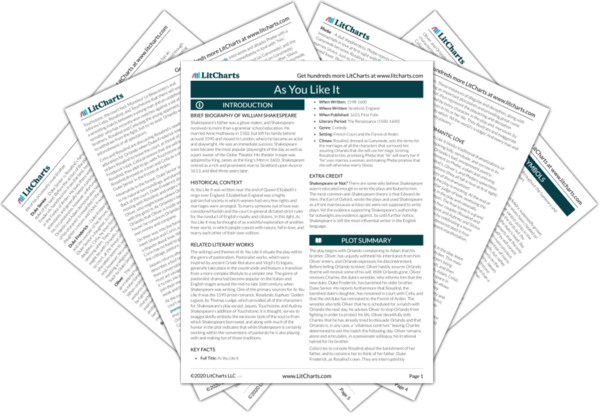The play is structured around two pairs of siblings and one pair of cousins—Orlando and Oliver, Duke Senior and Duke Frederick, Celia and Rosalind. Each pair has a different dynamic, defined by varying degrees of familial love and desire for power. Whereas the relationships between Oliver and Orlando and between the two dukes are characterized by competition, envy, and power mongering, Celia and Rosalind maintain a relationship characterized by love and inseparability.
By the end of the play, however, love and mutual understanding become defining features of all of these close family ties, even for the spiteful male siblings: Orlando looks past Oliver’s prior evil and saves his brother from a potentially fatal attack; returning his brother’s generosity, Oliver revokes his previous intent to kill Orlando and treats him as a true brother. Oliver and Orlando are then further united by their simultaneous marriage to the inseparable cousins, Rosalind and Celia. Even the malignant relationship between the dukes is resolved, as Duke Frederick, en route to fight his brother, encounters a religious man and is suddenly inspired to devote his life to a monastic existence. To fulfill his purpose and undo his past evil, he restores power to Duke Senior. In all of these relationships, conflict arises out of competition, jealousy, and a desire for unchallenged power. In all, these forces are shown to be ultimately less powerful than the force of love (for family, for God).
Love and Rivalry Between Relatives ThemeTracker

Love and Rivalry Between Relatives Quotes in As You Like It
My father charged you in his will to give me good education: you have trained me like a peasant, obscuring and hiding from me all gentlemanlike qualities. The spirit of my father grows strong in me, and I will no longer endure it.
I hope I shall see an end of him; for my soul, yet I know not why, hates nothing more than he. Yet he’s gentle, never schooled and yet learned, full of noble device, of all sorts enchantingly beloved.
Come, come, wrestle with thy affections.
Let’s away and get our jewels and our wealth together, devise the fittest time and safest way to hide us from pursuit that will be made after my flight. Now we go in content to liberty, and not to banishment.
Poor old man, thou prun’st a rotten tree that cannot so much as a blossom yield in lieu of all thy pains and husbandry. But come thy ways, we’ll go along together.
Twice did he turn his back and purposed so; but kindness, nobler ever than revenge, and nature, stronger than his just occasion, made him give battle to the lioness.











